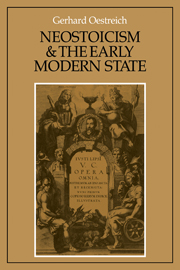Book contents
- Frontmatter
- Contents
- Foreword
- Introduction
- PART I JUSTUS LIPSIUS AND THE NETHERLANDS MOVEMENT
- 1 Constantia in publicis malis
- 2 The political intent in Neostoic philosophy
- 3 The main political work of Lipsius
- 4 Political Neostoicism
- 5 The military renascence
- 6 The European echo
- 7 The Netherlands movement in Brandenburg-Prussia
- PART II THE CONSTITUTIONAL DEVELOPMENT OF THE EARLY MODERN STATE
- Index
5 - The military renascence
Published online by Cambridge University Press: 04 May 2010
- Frontmatter
- Contents
- Foreword
- Introduction
- PART I JUSTUS LIPSIUS AND THE NETHERLANDS MOVEMENT
- 1 Constantia in publicis malis
- 2 The political intent in Neostoic philosophy
- 3 The main political work of Lipsius
- 4 Political Neostoicism
- 5 The military renascence
- 6 The European echo
- 7 The Netherlands movement in Brandenburg-Prussia
- PART II THE CONSTITUTIONAL DEVELOPMENT OF THE EARLY MODERN STATE
- Index
Summary
It must be remembered that the Republic of the United Provinces won its freedom by asserting itself in war. War and military life were thus the basis of its independence and at the heart of its sense of nationhood. Such self-assertion was possible only through military means. However, the warlike ethos which marked Dutch Calvinism at the end of the sixteenth century turned to one of pacifist isolationism after 1648. E. H. Kossmann states numerous reasons for this ‘dichotomy’ in the ideals of Dutch society and points to the conditions which, at the beginning of the century, caused war to be seen as an inevitable and acceptable part of the natural order. Ever since 1572, constant war (bellum perpetuum) had seemed the very condition of natural unity and florescence; the period of truce after 1609 caused the internal difficulties and tensions to erupt, so destroying the unity that had arisen during the time of struggle. And in fact the Dutch humanism of the period helped in the military safeguarding of independence and liberty. The three great military treatises of Lipsius, ranging from a general consideration of war and military matters, by way of Roman army organization, to the more specialized study of ancient military technique, set an example for further humanist endeavour in technical and practical spheres. The military reforms of the princes of Orange-Nassau, begun at the close of the sixteenth century, rested largely on the principles of Roman Stoicism, which, when applied to army life, were the principal reason for the success of the reforms.
- Type
- Chapter
- Information
- Neostoicism and the Early Modern State , pp. 76 - 89Publisher: Cambridge University PressPrint publication year: 1982
- 1
- Cited by



